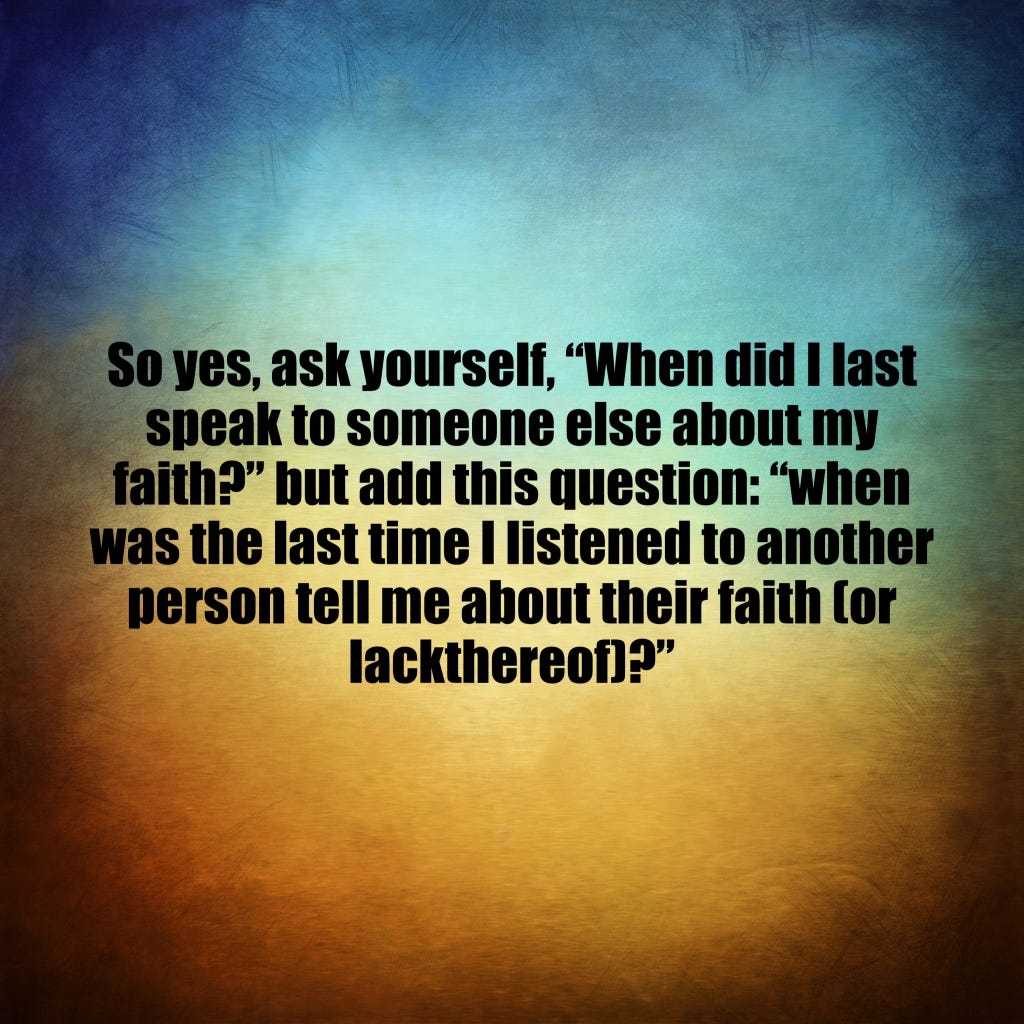Day 10: The Importance of Talking...and Listening.
#RethinkChurch is doing a 22-day journey for self-reflection based on John Wesley’s 22 questions. I will be trying to compose short blog posts addressing each question. I am using these posts to encourage Christians, especially Progressive and Mainline Christians to reflect deeply on what it means to be Church in a world marred by oppression and violence.
Day 10: When did I last speak to someone else about my faith?
This question evokes complicated feelings in me. I believe that Progressive Christians can be a very important witness in a society where the loudest voices that are amplified by the media and those with political power, tend to be those that use Christianity to justify war, racism, homophobia/transphobia, and sexism.
Popular expressions of American Christianity often display an unhealthy obsession with nationalism and they tend to be aligned with right wing political ideologies. Forget the reality that American Christianity (and Christianity in general) is incredibly diverse, the most prominent image of Christianity in the United States is one that ties religion and empire.
As a result, Progressive Christianity provides a much-needed counter narrative. Progressive Christianity is extremely diverse. Because one of the cornerstones of Progressive Christianity is its inclusivity and openness to racial and theological diversity there are no official creedal statements that all Progressive Christians must adhere to. You can find those who believe Jesus literally and physically rose from the dead, while others believe the resurrection was spiritual or more symbolic.
There are Progressive Christians who believe Jesus was both God and Man, while others assert that Jesus was man, but the perfect manifestation of God’s will on earth. But despite the theological diversity, Progressive Christianity, (in general) advocate for LGBTQ+ rights outside and within the Church, for racial justice, against blind nationalism and unjust wars, for an end to poverty, etc. Many Progressive Christians refuse to condemn their atheist, agnostic, and non-Christian peers to hell (if they believe in hell, many of us do not).
Progressive Christianity, at its best, can provide a powerful contrast to forms of Christianity that combine American nationalism with faith, that endorse white supremacy, that reject the humanity of the LGBTQ+ community, and that enforce strict gender roles. Progressive Christians should make it known that Christianity can be a religion of radical liberation.
But I also do want to say that I think Christians in general talk too much and need to listen more. Sometimes, Christians, including those of us who call ourselves Progressive, dominant conversations in the public sphere, as if atheists, agnostics, Muslims, Wiccans, Hindus, Jewish people etc. do not exist. Often, we give lip service to our nonreligious peers or to people of different religious faiths, but we do not always critically examine the ways we may also be alienating them by dominating public discourse.
For example, it is easy to be thrilled when a politician expresses a more Progressive and inclusive version of Christianity. Nevertheless, for those who aren’t Christian, the question isn’t, which form of Christianity should be publicly endorsed by politicians but why is Christianity being used to justify certain policy decisions at all? After all, there is a difference between me and you using faith to express political positions and a politician doing the same thing. Even if the form of Christianity endorsed by politicians is progressive and ostensible inclusive, it can still be alienating.
I am, of course, not saying that as Progressive Christians we need to be quiet. Of course not, especially when other forms of Christianity want to dominant the public conversation and claim that they express the only “true” version of Christianity. But I do think we need to be willing to listen. We shouldn’t just be concerned about expressing our faith but we should be curious about the faith or lack of religious beliefs of other people, not to convert them or “prove” to them that our version of Christianity is different, but because we are genuinely interested in hearing the stories of other people.
So yes, ask yourself, “When did I last speak to someone else about my faith?” but add this question: “when was the last time I listened to another person tell me about their faith (or lackthereof)?”
Day 1: Illusions of Perfection
Day 2: The Dangers of Embellishment
Day 3: Loose Lips Sink Ships or Silence Kills?
Day 5: The Oppression of Professionalism
Day 6: Mental Illness and Distorted Thinking



